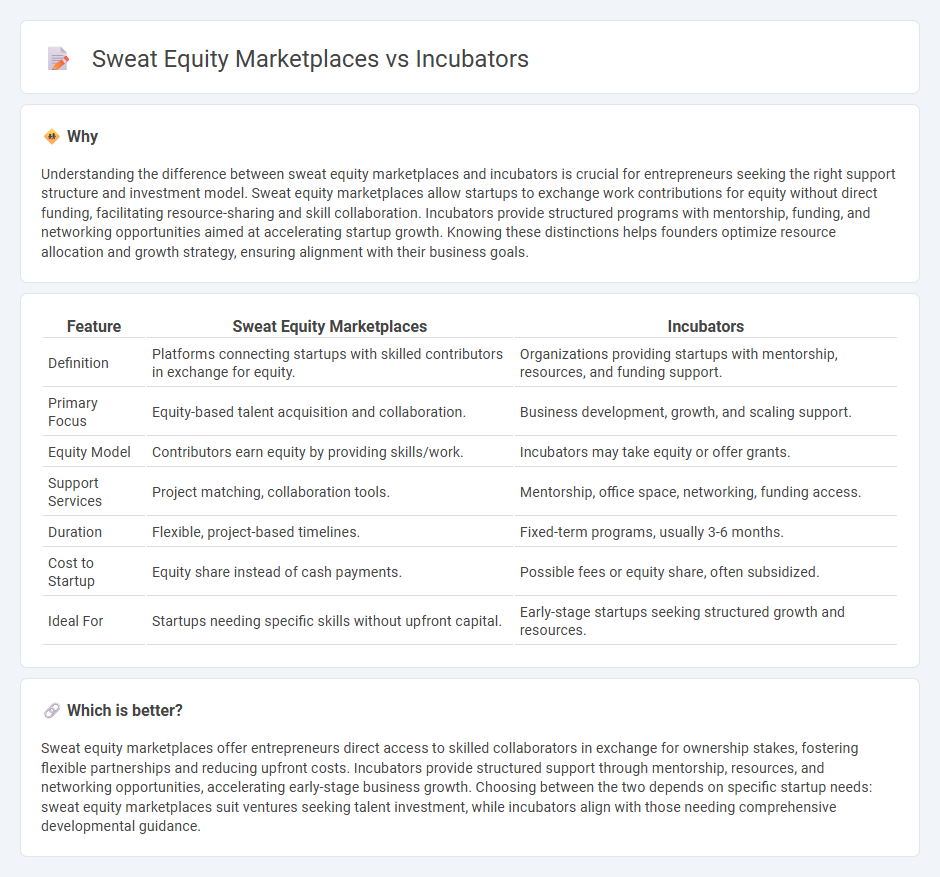
Sweat equity marketplaces connect entrepreneurs with investors who exchange labor and expertise for ownership stakes, enabling startups to grow without substantial initial capital. Incubators provide structured support, mentorship, and resources to early-stage companies, accelerating their development through curated programs and networks. Explore how these platforms uniquely empower entrepreneurs to scale their ventures.
Why it is important
Understanding the difference between sweat equity marketplaces and incubators is crucial for entrepreneurs seeking the right support structure and investment model. Sweat equity marketplaces allow startups to exchange work contributions for equity without direct funding, facilitating resource-sharing and skill collaboration. Incubators provide structured programs with mentorship, funding, and networking opportunities aimed at accelerating startup growth. Knowing these distinctions helps founders optimize resource allocation and growth strategy, ensuring alignment with their business goals.
Comparison Table
| Feature | Sweat Equity Marketplaces | Incubators |
|---|---|---|
| Definition | Platforms connecting startups with skilled contributors in exchange for equity. | Organizations providing startups with mentorship, resources, and funding support. |
| Primary Focus | Equity-based talent acquisition and collaboration. | Business development, growth, and scaling support. |
| Equity Model | Contributors earn equity by providing skills/work. | Incubators may take equity or offer grants. |
| Support Services | Project matching, collaboration tools. | Mentorship, office space, networking, funding access. |
| Duration | Flexible, project-based timelines. | Fixed-term programs, usually 3-6 months. |
| Cost to Startup | Equity share instead of cash payments. | Possible fees or equity share, often subsidized. |
| Ideal For | Startups needing specific skills without upfront capital. | Early-stage startups seeking structured growth and resources. |
Which is better?
Sweat equity marketplaces offer entrepreneurs direct access to skilled collaborators in exchange for ownership stakes, fostering flexible partnerships and reducing upfront costs. Incubators provide structured support through mentorship, resources, and networking opportunities, accelerating early-stage business growth. Choosing between the two depends on specific startup needs: sweat equity marketplaces suit ventures seeking talent investment, while incubators align with those needing comprehensive developmental guidance.
Connection
Sweat equity marketplaces enable entrepreneurs to exchange skills and labor for equity in startups, fostering resource-efficient growth. Incubators provide structured support, mentorship, and access to these marketplaces, amplifying startup success rates. The synergy between sweat equity platforms and incubators accelerates innovation and funding opportunities for early-stage ventures.
Key Terms
Startup Support
Incubators provide startups with structured mentoring, office space, and access to a network of investors, fostering growth through hands-on guidance and resources. Sweat equity marketplaces connect entrepreneurs with skilled professionals offering services in exchange for equity, creating flexible support based on specific project needs. Discover more about how these models uniquely empower startup success and strategic growth opportunities.
Ownership Stake
Incubators often provide startups with seed funding, mentorship, and resources in exchange for an equity stake, typically leading to shared ownership structured through formal agreements. Sweat equity marketplaces facilitate the exchange of labor and expertise for ownership shares, enabling founders and contributors to negotiate stake percentages based on contributed effort and value. Explore the differences in ownership dynamics and benefits between incubators and sweat equity marketplaces to make informed decisions about startup growth strategies.
Resource Exchange
Incubators provide startups with structured support including mentorship, office space, and funding, facilitating early-stage growth through bundled services. Sweat equity marketplaces enable entrepreneurs to trade skills and time for ownership stakes, fostering resource exchange without direct financial investment. Explore how these platforms transform startup development by maximizing collaborative resource sharing.
Source and External Links
What is a business incubator? | BDC.ca - A business incubator is a program that supports early-stage companies with mentorship, investment access, and resources such as shared office space, to help them develop from the idea stage to market readiness.
Incubators - QB3 - QB3's Bakar Bio Labs at UC Berkeley is a full-service biotech incubator providing wet-lab and office space, advanced equipment, business support, and access to campus resources and programming for emerging biotech companies.
Incubators at Tractor Supply Co. - Tractor Supply offers egg incubators for poultry and waterfowl, with automated and manual models designed to control temperature, humidity, and egg turning for optimal hatching success.
 dowidth.com
dowidth.com